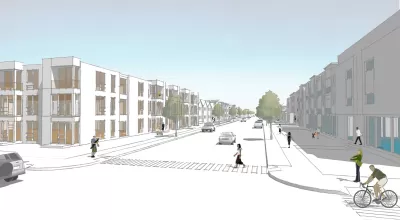Recent analysis from the Pew Research Center identifies more support for zoning reform as a tool for maintaining the affordability of rental housing in U.S. cities.

Four U.S. jurisdictions—Minneapolis; New Rochelle, New York; Portland, Oregon; and Tysons, Virginia—helped slow rent growth by approving new zoning codes that allowed more residential development, according to a recent article by Alex Horowitz and Ryan Canavan for the Pew Research Center.
“The Pew Charitable Trusts examined the changes in these four jurisdictions because they all have received attention for revising their formerly restrictive zoning codes and allowing more housing,” according to the article. “This finding from the four jurisdictions examined supports the argument that updating zoning to allow more housing can improve affordability.”
The evidence from these four cities argues that market-rate housing development is sufficient in helping slow rent growth. “In all four places studied, the vast majority of new housing has been market rate, meaning rents are based on factors such as demand and prevailing construction and operating costs,” according to the article. “The evidence indicates that adding more housing of any kind helps slow rent growth.”
A separate study by the Urban Institute, published just a few weeks earlier, found similar results, adding fuel to the zoning reform cause in one of the most hotly debated topics in contemporary planning.
Pew used data Apartment List Rent Estimate data downloaded on March 22, 2023 to perform the analysis, which can be read in its entirety at the link below.
FULL STORY: More Flexible Zoning Helps Contain Rising Rents

Alabama: Trump Terminates Settlements for Black Communities Harmed By Raw Sewage
Trump deemed the landmark civil rights agreement “illegal DEI and environmental justice policy.”

Planetizen Federal Action Tracker
A weekly monitor of how Trump’s orders and actions are impacting planners and planning in America.

How Atlanta Built 7,000 Housing Units in 3 Years
The city’s comprehensive, neighborhood-focused housing strategy focuses on identifying properties and land that can be repurposed for housing and encouraging development in underserved neighborhoods.

In Both Crashes and Crime, Public Transportation is Far Safer than Driving
Contrary to popular assumptions, public transportation has far lower crash and crime rates than automobile travel. For safer communities, improve and encourage transit travel.

Report: Zoning Reforms Should Complement Nashville’s Ambitious Transit Plan
Without reform, restrictive zoning codes will limit the impact of the city’s planned transit expansion and could exclude some of the residents who depend on transit the most.

Judge Orders Release of Frozen IRA, IIJA Funding
The decision is a victory for environmental groups who charged that freezing funds for critical infrastructure and disaster response programs caused “real and irreparable harm” to communities.
Urban Design for Planners 1: Software Tools
This six-course series explores essential urban design concepts using open source software and equips planners with the tools they need to participate fully in the urban design process.
Planning for Universal Design
Learn the tools for implementing Universal Design in planning regulations.
Jessamine County Fiscal Court
Caltrans
Institute for Housing and Urban Development Studies (IHS)
City of Grandview
Harvard GSD Executive Education
Toledo-Lucas County Plan Commissions
Salt Lake City
NYU Wagner Graduate School of Public Service





























